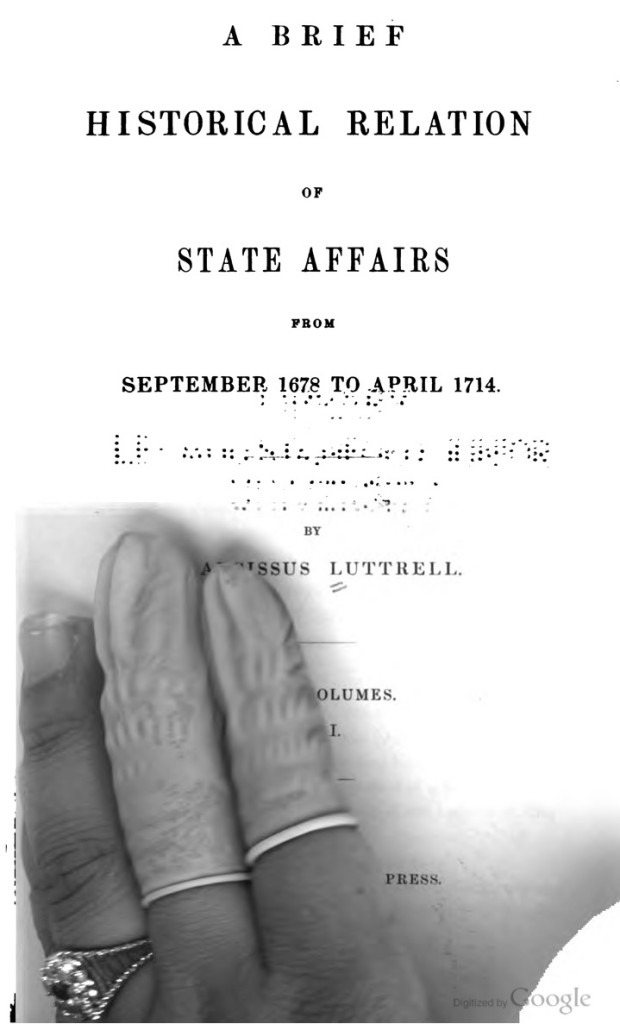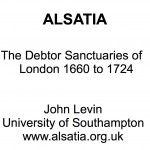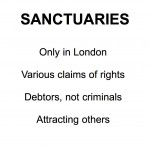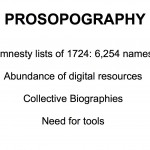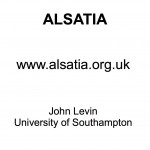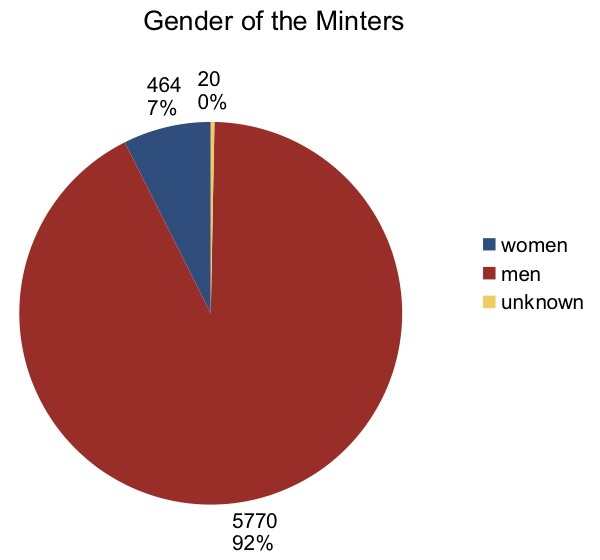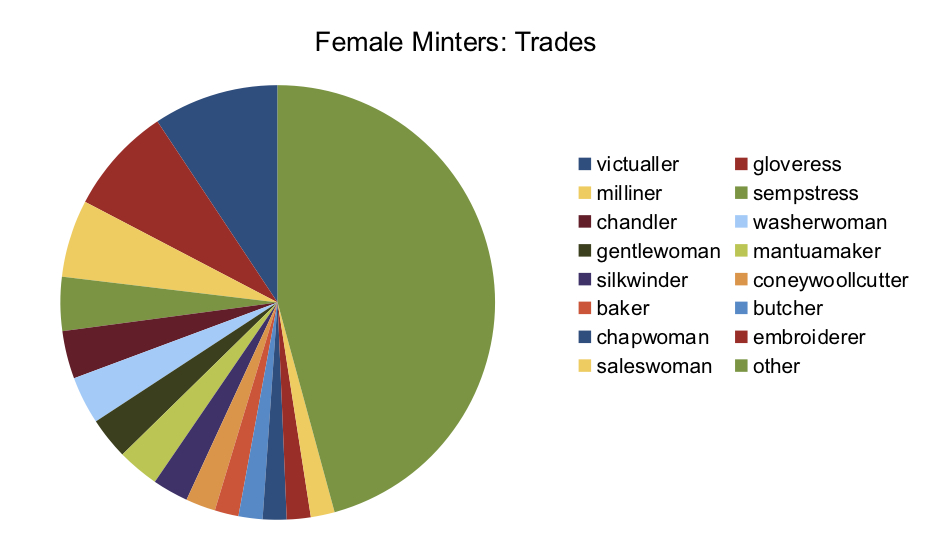I have previously – and only briefly – discussed the 1697 act against the sanctuaries, looking at those places named in it, and their geographical distribution. Below, I present the full text of the statute. The abolition of ‘pretended privileged places’ is just one clause, number 15, out of 22. The rest of the act concerns the management of the prisons, specifically the Fleet and the King’s Bench, the escape of imprisoned debtors, and extortionate practices against prisoners. Certain provisions tacked on the end are made for particular individuals.
Again, as with the other legislation I’ve transcribed, it’s nearly impossible to read. Every clause is a single sentence, every sentence a clause, terms are continually repeated, singulars reinforced with plurals. And that’s before considering the archaic and latin terms used. Add to this the need for context – the motivations driving the law, the parliamentary debate around it, the manner of its writing, the whole legal apparatus producing and enforcing it – and the modern reader is at a considerable distance from it. This distance is further increased given the way the laws inter-relate with each other, defining terms, clarifying clauses, repealing some sections, augmenting others. The whole of the law is more than the sum of its statutes.
So this body of texts requires different ways of reading, to bring out the structures, links and patterns embodied within. Laws can be data-mined, to pull out names and locations for example. The vocabulary can be counted, to show stock phrases and unusual occurrences. Texts can be visualized, with ‘graphs, maps and trees’, to use Franco Moretti’s taxonomy. The computer now allows us to do this, although not as easily as one might think. In this way one can read the whole of the law, going beyond the time-consuming, comprehension-limited and mind-melting strictures of turning every page.
My next few posts will look at ways of analyzing the tortured prose below. But as a quick taster, note that the section pertaining to the sanctuaries adds ‘she’ and ‘her’ to the list of subjects, as in “he, she or they.” Only in this one clause, and then only towards the end, in the parts relating to the aiding, abetting and concealing escapees, are women so specified. From the other legislation I’ve read, this is quite rare; a quick search has revealed a solitary ‘she’ in the Black Act §2. Gender in the law is an important question, and one eminently susceptible to the digital techniques as mentioned above.
Note: Spelling has not been modernised; italics and marginalia have been omitted.
8 & 9 William III c.27 An act for the more effectual relief of creditors in cases of escapes, and for preventing abuses in prisons and pretended privileged places.
Whereas by reason of the many grievous extortions and ill practices of such persons who have for several years past respectively executed the offices of marshal of the King’s Bench, warden of the Fleet, and keeper of the Marshalsea, Newgate, and other prisons, and by several pretended privileged places within this realm, both creditors and debtors have been notoriously abused, and the good intents on the law wholly eluded: for reformation thereof be it enacted by the King’s most excellent majesty, by and with the advice and consent of the lords spiritual and temporal, and commons, in this present parliament assembled, and by the authority of the same, That from and after the first day of May, one thousand six hundred ninety seven, all prisoners, either upon contempt or mesne process, or in execution, who are or shall be committed to the custody of the marshal of the King’s bench prison, or the warden of the Fleet, shall be actually detained within the said prisons of the King’s Bench and Fleet, or the respective rules of the same, until they shall be from thence discharged by due course of law; and if at any time from and after the said first day of May, the said marshal or warden, or any other keeper or keepers of any prison, shall permit and suffer any prisoner committed to their custody, either on mesne process or in execution, to go or be at large out of the rules of their respective prisons (except by virtue of some writ of Habeas Corpus, or rule of court, which rule of court shall not be granted but by motion made or petition read in open court) every such going or being out of the said rules shall be adjudged and deemed, and is hereby declared to be an escape.
II. And be it further enacted by the authority aforesaid, That from and after the said first day of May, every person or persons obtaining judgement in any action of escape against the said marshal or warden, or their respective lawful deputy or deputies, shall and may have, not only several remedies already by law allowed for obtaining satisfaction thereon, but the judges of the respective courts where such judgement shall be obtained (upon oath before them made by the persons or persons obtaining such judgement, that the same was obtained without fraud or covin, and that the debt of the prisoner making such an escape was a true and real debt and unsatisfied) shall, upon motion made to them in open court for that purpose, sequester the fees and profits of the office of marshall or warden, or so much, or such part or proportion thereof, as the said court wherein such motion shall be made shall think it fit and reasonable, with respect to the debt or debts due from such prisoner or prisoners so escaping, and in the first place apply the same towards satisfaction of the debt or debts due from the prisoner or prisoners who escaped, together with all costs and damages recovered in such action of escape.
III. And to the end that such satisfaction may not be deferred by any writ of error brought for delay only, be it enacted, That if the said marshal or warden, or their respective deputy or deputies, shall at any time after the said first day of May, sue forth any writ or writs of error to reverse any judgment given in any action of escape, such marshal or warden, or their respective deputy of deputies, shall be obliged to put in special bail, or in default thereof no execution shall be stayed, nor any sequestration of the profits delayed.
IV. And whereas it is notorious that divers great sums of money and other rewards have been given to, and actually received by, the several persons executing the respective offices of marshal and warden, and other keepers of the several prisons within this kingdom, to assist or permit prisoners in their custody to escape, in open defiance and contempt of the laws of this realm: for preventing the like evil practices for the time to come, be it further enacted, That if any marshal or warden, or their respective deputy or deputies, or any keeper of any other person within this kingdom, shall take any sum of money, reward or gratuity whatsoever, or security for the same, to procure, assist, connive at, or permit any such escape, and shall thereof be lawfully convicted, the said marshal or warden, or their respective deputy or deputies, or such other keeper of any prisons as aforesaid, shall for every such offence forfeit the sum of five hundred pounds, and his said office, and be for ever after incapable of executing any such office.
V. Provided always, That this act, nor any thing therein contained, shall extend, or be construed to extend to make void such securities, or any of them, as shall at any time or times hereafter be given by any prisoner or prisoners for his or their lodging or lodgings without the aforesaid prisones, or ether of them, within the rules of the said prisons of King’s Bench and Fleet, or either of them, so as such security or securities be not taken for the enlargement of any prisoner or prisoners out of or beyond the rules of the said prisons of King’s Bench and Fleet, or either of them respectively.
VI. And be it further enacted by the authority aforesaid, That from and after the said first day of May, no retaking on fresh pursuit shall be given in evidence on the trial of any issue in any action of escape against the said marshal or warden, or their respective deputy or deputies, or against any other keeper or keepers of any other prison or prisons as aforesaid, unless the same be specially pleaded, nor shall any special plea be taken, received, or allowed, unless oath can be first made in writing by the marshal or warden, or their respective deputy or deputies, or by such other keeper or keepers of any other prison or prisons as aforesaid, against whom such action shall be brought, and filed in the proper office of the respective courts, that the prisoner for whose escape such action is brought did without his consent, privity, or knowledge make such escape; and if such affidavit shall at any time afterwards appear to be false, and the marshal or warden or other keeper or keepers of any other prison or prisons, shall be convicted thereof by due course of law, such marshal or warden or other keeper or keepers of any other prison or prisons shall forfeit the sum of five hundred pounds.
VII. And be it further enacted and declared by the authority aforesaid, That if at any time after the said first day of May, any prisoner who is or shall be committed in execution to either or any of the said respective prisons, shall escape from thence by any ways or means howsoever, the creditor or creditors, at whose suit such prisoner was charged in execution at the time of his escape, shall or may retake such prisoner by any new Capias, or Capias ad satisfaciendum, or sure forth any other kind of execution on the judgment, as if the body of such prisoner had never been taken in execution.
VIII. And be it further enacted by the authority aforesaid, That if the said marshal or warden for the time being, or their respective deputy or deputies, or other keeper or keepers of any other prison or prisons, shall, after one day’s notice in writing given for that purpose, refuse to shew any prisoner committed in execution to the creditor at whose suit such prisoner was committed or charged, or to his attorney, every such refusal shall be adjudged to be an escape in law.
IX. And be it further enacted and declared by the authority aforesaid, That if any person or persons whatsoever, desiring to charge any person with any action or execution, shall desire to be informed by the said marshal or warden, or their respective deputy or deputies, or by any other keeper or keepers of any other prison or prisons, whether such person be a prisoner in his custody, or not, the said marshal or warden, or such other keeper or keepers of any other prison or prisons, shall give a true note in writing thereof to the person so requesting the same, or to his lawful attorney, upon demand at his office for that purpose, or in default thereof shall forfeit the sum of fifty pounds; and if such marshal or warden, or their respective deputy or deputies exercising the said office, or other keeper or keepers of any other prison or prisons, shall give a note in writing that such person is an actual prisoner in her custody, every such note shall be accepted and taken as sufficient evidence that such person was at that time a prisoner in actual custody.
X. And be it further enacted and declared by the authority aforesaid, That on or before the four and twentieth day of June, one thousand six hundred ninety seven, all and every the conveyances, grants, and mortgages of the inheritance of the aforesaid prisons of King’s Bench and Fleet, or either of them, and of the prison-houses, lands, tenements, buildings, and other hereditaments to the said prisons of King’s Bench and Fleet or either of them respectively belonging, or in any wise appertaining, and all leases thereof, and the respective titles of the marshal of the King’s Bench and warden of the Fleet prisons thereunto, or of him or them in whom the inheritance or inheritances of, in, and to the said prisons, and prison-houses, and premises, or either of them, now are, and all trusts and declarations of trusts thereunto, or unto either of them relating, shall be inrolled (viz.) that of the marshal of the King’s Bench in the King’s Bench court, and that of the warden of the Fleet in the court of Common Pleas at Westminster; and that all future conveyances, grants, and mortgages, of the inheritance of the said prisons of King’s Bench and Fleet, or of either of them, or of any part of either of them, and all leases thereof, and all trusts and declarations of trust thereunto or unto either of them relating, shall be so inrolled in the respective courts, as aforesaid, within six months next after the executing of every or any such conveyances, grants, mortgages, or leases, or such trusts or declarations of trusts thereunto or unto either of them relating, or of any of them; and if any such conveyances, grants, or mortgages, of the inheritance of the said prisons of King’s Bench or Fleet, or either of them, or of any part of either of them, of any such trusts or declarations of trust thereunto or unto either of them relating, or any leases of the said premisses, be not so inrolled within the times limited as aforesaid, in the said courts respectively, as aforesaid, that then and in such case, as well the present as all future conveyances, grants, and mortgages of every of them, and the inheritance of the said prisons of King’s Bench and Fleet, or either of them, or of any part of either of them, and all leases thereof, and all trusts and declarations of trust thereunto, or unto any of them relating, shall be and are hereby declared to be utterly void and of none effect, as if the same had never been executed; any law, statute, or custom, to the contrary thereof in any wise notwithstanding.
XI. And be it further enacted and declared by the authority aforesaid, That from and after the said first day of May, the said offices of marshal of the King’s bench prison, and warden of the Fleet, and each of them, shall be executed by the several persons to whom the inheritance of the prisons, prison-houses, lands, tenements, and other hereditaments, of the said prisons of King’s Bench and Fleet, or either of them, shall then belong or appertain respectively, in his or their respective proper person or persons, or by his or their sufficient deputy or deputies; for which deputy or deputies, and for all forfeitures, escapes, and other misdemeanors, in their respective offices by such deputy or deputies permitted, suffered, or committed, the said person or persons, in whom the aforesaid inheritances respectively are or shall then be, shall be answerable, and the profits and aforesaid inheritances of the said several offices shall be sequestred, seized, or extended to make satisfaction for such forfeitures, escapes, and misdeameanors respectively, as if permitted, suffered, or committed by the person or persons themselves, or either of them, in whom the respective inheritances of the said prisons shall then be.
XII. And whereas the way of proceeding against the warden of the Fleet prison by bill in the courts of Common Pleas and Exchequer at Westminster is found to be very dilatory; be it further enacted by the authority aforesaid, That from and after the said first day of May, it shall and may be lawful to and for any person or persons, having cause of action against the warden of the Fleet prison, upon bill filed in the said courts of Common Please or Exchequer against the said warden, and a rule being given to plead thereto, to be out eight days at most after filing such bill, to sign judgment against the said warden of the Fleet, unless he plead to the said bill within three days after such rule is out.
XIII. And for the more easy and quick obtaining of judgment against any person or persons who now is or hereafter shall be a prisoner or prisoners in the aforesaid prison of the Fleet; be it further enacted by the authority aforesaid, That from and after the said first day of May, it shall and may be lawful to and for any person or persons, who hath or shall have any cause of action against any prisoner or prisoners, who now is, or are, or hereafter shall be committed to the said prison of the Fleet, after filing or entring of a declaration in such action with the proper officer, to deliver a copy of such declaration or declarations to any such defendant or defendants in any personal action or actions, or to the turnkey or porter of the said Fleet prison, and, after rule given thereupon to plead, to be out at eight days at most after delivery of such copy of declaration or declarations, and affidavit made of such delivery before the lord chief justice, or one other of the justices of the Common Pleas, or before the lord chief baron, or some other of the barons of the coif of the Exchequer at Westminster, of the delivery of such declaration or declarations to the defendant or defendants, in such action or actions, or to the turnkey or porter of the said Fleet prison, as aforesaid, to sign judgment in such action or actions against such defendant or defendants, as if such defendant or defendants had been actually charged at the bar of the Common Pleas or Exchequer with such action or actions; any law, statute, usage, or custom, to the contrary thereof in any wise notwithstanding.
XIV. And whereas great sums of money have been and are still taken of the prisoners of the aforesaid prisons of King’s Bench and Fleet, and other prisons, under pretence of chamber rent, although the said prisoners have not had the actual possession of any chamber within the said prisons, or any of them; for the avoiding of that inconvenience for the future be it enacted, That from and after the said first day of May, no prisoner or prisoners shall pay, or be compellable to pay any chamber rent for any chamber within either or any of the said prisons, for an longer time than he or they is or are actually in possession of the said chamber or chambers, and that during such time as he or they is or are actually in possession of any such chamber or chambers within either or any of the said prisons as aforesaid, such prisoner or prisoners shall not pay above the sum of two shillings and six pence per week for any such chamber; and if the marshal of the King’s Bench prison, warden of the Fleet, or keeper or keepers of any other prison or prisons, as aforesaid, shall take or demand any greater sum or sums of money for the use of such chamber, than the sum of two shillings and six pence per week, he or they so taking or demanding shall in such case, for every such offence, forfeit the sum of twenty pounds.
XV. And for the preventing for the future the many notorious and scandalous practices used in many pretended privileged places in and about the cities of London and Westminster, and borough of Southwark in the county of Surrey, by obstructing the execution of legal process there, and thereby defrauding and cheating great numbers of people of their honest and just debts; be it further enacted by the authority aforesaid, That from and after the said first day of May, it shall and may be lawful for any person or persons, who have or hath any debt or debts, sum or sums of money due or owing to him from any person or persons who now is, or hereafter shall be and reside within the White Friers, Savoy, Salisbury Court, Ram Alley, Mitre Court, Fuller’s Rents, Baldwin’s Gardens, Montague Close, or the Minories, Mint, Clink, or Deadman’s Place, upon legal process taken out against such person or persons, to demand and require the sheriffs of London and Middlesex, head bailiff of the liberty of the duchy of Lancaster, or high sheriff of the county of Surrey, or bailiff of the liberty of the borough of Southwark for the time being (as the case shall require, if the plaintiff think it requisite) or their respective deputy or deputies, officer or officers, to take, and they are hereby enabled respectively to take the Posse Comitatus, or such other power as to him or them or any of them shall seem requisite, and enter the said pretended privileged place, and any or either of them (as the case shall require) and to arrest, and in the case of resistance or refusal to open the doors, to break open any door or doors to arrest such person or persons upon any mesne or other process, extent or execution, or to seize the goods of any such person or persons upon any execution or extent; and if the said sheriff or sheriffs, head bailiff, or their deputy or deputies, officer or officers, or either or any of them shall neglect or refuse (upon such request) with such force to do their best endeavours for the executing of such process, execution or extent, he or they so neglecting or refusing to execute such process, execution or extent, shall forfeit to the plaintiff or plaintiffs in such action the sum of one hundred pounds, to be recovered by action of debt, bill, plaint or information, in which no essoin, protection, or wager of law, or more than one imparlance shall be allowed; and if in the executing of such process, execution or extent, any person or persons shall oppose or resist any such officer or officers, or any of them, or any who shall be aiding or assisting to him, them, or any of them, in the executing of such process, execution or extent, he or they so offending shall, for every time he or they shall so offend, forfeit the sum of fifty pounds, and moreover shall be by some justice of the peace committed to the common gaol of such county, city or place where such offence shall be committed, there to remain without bail or mainprize until the next assizes, sessions of oyer and terminer, and general gaol delivery, to be held for such county, city or place; and such offender or offenders being of such offence or offences duly convicted, every such offender shall suffer and undergo such imprisonment, and be set in the pillory, as the court where such conviction shall be shall think fit; and if any rescous shall be made of any prisoner taken by any such officer or officers as aforesaid, upon any such process, execution or extent, within the limits of any the before mentioned pretended privileged places, by any person or persons whatsoever, such person or persons so making such rescous, or aiding, assisting or abetting the same, and being thereof lawfully convicted, shall respectively forfeit to the plaintiff in any such action the sum of five hundred pounds, to be recovered by action of debt, bill, plaint or information, in any of his Majesty’s courts at Westminster, in which action, bill, plaint or information, no essoin, privilege, protection, wager of law, or more than one imparlance shall be allowed; and if after such recovery had against any person or persons for such rescous, or for aiding, assisting or abetting the same, the person or persons against whom such recovery shall be had, shall refuse or neglect to pay to the plaintiff in such action, or to his, her or their executors, administrators or assigns, the sum or sums of money recovered, with full costs of suit, within one month after judgment signed upon such recovery, and demand made, that then the person or persons so refusing or neglecting as aforesaid, upon producing a copy of the judgment upon which such recovery shall be had, and oath made that the money recovered is not paid, shall, by order of such court wherein the said person or persons was or were so convicted, of or for any suit rescous, or for aiding, assisting or abetting the same, be transported by the sheriff or sheriffs of the county, city or place where such conviction shall happen to be, to one of his Majesty’s plantations beyond the seas, there to remain for the space of seven years; and if the person or persons so transported, shall return again to this kingdom within the space of seven years, he, she or they so returning, shall be and is hereby adjudged guilty of felony, and shall not be allowed the benefit of clergy, but shall suffer and forfeit as in cases of felony where clergy is not allowed; and if any person or persons, inhabiting within either or any of the aforesaid pretended privileged places, shall receive, conceal or harbour any person or persons, who shall have made any rescous as aforesaid, he, she or they so receiving, concealing or harbouring any such person or persons, knowing or having had notice that such person or persons had been guilty of such offence, being thereof convicted by due course of law, shall be, by order of that court where such conviction shall happen to be, by the sheriff or sheriffs of the county, city of place where the offence was committed, transported to some or one of his Majesty’s plantations beyond the seas, there to remain for the space of seven years, unless such person or persons shall, within the space of one month next after such conviction, pay to the plaintiff or plaintiffs in such action or suit, the full debt or duty for which such action or suit was brought, with full costs; and if he, she or they shall return into this kingdom within the said space of seven years, he, she or they so returning, shall be and is hereby adjudged guilty of felony, and shall not be allowed the benefit of clergy, but shall suffer and forfeit as in cases of felony, where clergy is not allowed.
XVI. And be it further enacted, That the several penalties before in and by this act inflicted, and not particularly disposed of, shall go one half to his Majesty, his heirs and successors, and the other half to him or them that will sue for the same, to be recovered as aforesaid.
XVII. And for the prevention of disputes touching this act, be it enacted by the authority aforesaid, That the same, and every clause and thing therein contained, shall be deemed, adjudged, and taken to be a general law, and that it shall not be needful to shew or set forth the same or any clause thereof in pleading, and that the same, and all clauses therein, shall be construed most largely and beneficially for the preventing of all the mischiefs, abuses, escapes, and other inconveniences herein provided against; and further, that if any person or persons shall at any time be sued for putting in execution any power or authority given by this act, such person and persons shall and may plead the general issue, and give in evidence this act, and the special matter; and if the plaintiff or plaintiffs in such action shall be nonsuit, or a verdict given for a defendant or defendants, or if the plaintiff or plaintiffs discontinue their action, or if upon demurrer judgment shall be given for the defendant or defendants, every such defendant or defendants shall have his or their double costs.
XVIII. Saving unto Martha Johnson widow, Thomas Johnson, and John Johnson, sons of the said Martha, and Frances her daughter, their heirs, executors, administrators and assigns, all such right, title, estate, equity, interest and demand, as she or they now have, or shall or may have, challenge or claim, of, in or unto all or any of the houses and shops belonging to the office of the warden of the Fleet, or to the prison of the Fleet, herein before contained, as fully and effectually, to all intents and purposes, as she or they had before the making of this act, as if this act had never been had or made.
XIX. Provided nevertheless, That nothing in this act contained shall extend to prejudice, impeach, or lessen any security or securities for any sum or sums of money made or given, by or out of the said office of marshal of the Marshalsea of the couret of King’s bench, or the profits thereof, by William Lenthall esquire, to Sir John Cutler baronet deceased, or to Edmund Boulter esquire, executor of the said Sir John Cutler, or to any other person or persons in trust for them or either of them, or to subject the said office, or the profits thereof, or the person or persons in whom the same are or shall be vested, to any of the forfeitures or penalties in this act contained, other than such as they are or may be liable unto before the making of this act, until such sum or sums of money, secured thereby, shall be fully satisfied and paid; any thing in this act contained to the contrary thereof notwithstanding.
XX. Saving unto Anthony Smith mariner, his heirs, executors, administrators and assigns, all such right, title, estate, equity, interest and demand, as he or they now have, or shall or may have, challenge or claim, of, in or unto the office of the warden of the Fleet, or the prison of the Fleet, or all or any of the houses and shops belonging to the office of warden of the Fleet, or to the prison of the Fleet, or herein before contained (by virtue of two decrees in Chancery, the one of them made the two and twentieth day of June, one thousand six hundred eighty three, and the other of them the six and twentieth day of January, one thousand six hundred eighty five, whereby four hundred twenty five pounds, and the interest thereof, was and is decreed to be paid to the said Anthony Smith out of the said office, houses, shops and appurtenances, after a mortgage made thereof by Thomas Bromhall unto Henry Norwood esquire was satisfied) as fully and effectually to all intents and purposes, as he or they had before the making of this act, and as if this act had never been had or made.
XXI. Provided nevertheless, That nothing in this act contained shall be deemed, construed or adjudged to take away, lessen, charge or prejudice the right, title or interest of Thomas Norwood, surviving executor of Henry Norwood, as for, touching or concerning a debt of two thousand one hundred fifty and three pounds, and interest, secured to the said Henry Norwood, by virtue of a mortgage of the office of warden of the Fleet prison, bearing date the twenty third day of November, in the year of our Lord one thousand six hundred seventy and six, or so much thereof as is justly due thereupon; nor to take away, lessen or prejudice the right, title or interest of John Clements of the Middle Temple, London, gentleman, as for, touching or concerning a debt of two thousand two hundred ninety nine pounds, and interest, secured to the said John Clement, in trust for himself and others, by virtue of a mortgage of the said office of warden, bearing date the third of May, one thousand six hundred seventy and eight, or so much thereof as is justly due thereupon.
XXII. And be it further enacted and declared by the authority aforesaid, That all and every deputation or deputations, grant or grants, at any time heretofore made or executed by William Lenthall esquire, of the said office of marshal of the Marshalsea of the said court of King’s Bench, is and are hereby declared void and of none effect; and that all and every succeeding marshal shall from time to time, and at all times hereafter, be constituted and appointed by the said William Lenthall, his heirs and assigns, by and with the consent in writing under the hand and seal of Edmund Boulter esquire, his executors, administrators and assigns, until the debt owing by the said William Lenthall to the said Edmund Boulter, executor of Sir John Cutler baronet deceased, be satisfied.
Source: Pickering, Danby, ed., The Statutes at Large, vol. 10.

